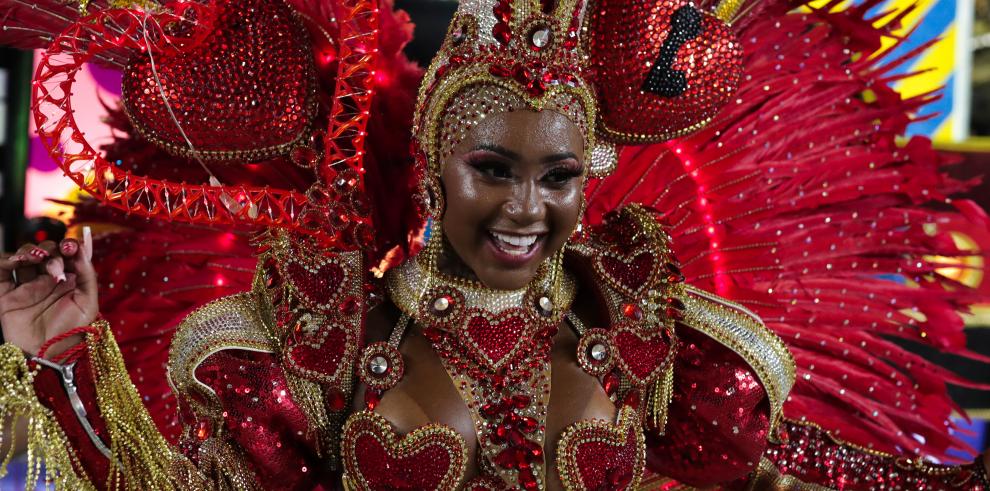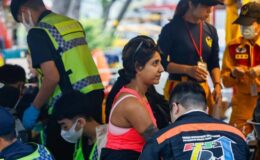Brazil Carnival carries extra meaning with subsiding of Covid.
- By : James Bryson
- Category : World Events

Viradouro, champion samba school of 2020, before the covid silenced the party for two years, starred this Saturday in a parade in which he compared the current carnival with that of 1919, the most lively in the history of Rio de Janeiro, since celebrated the end of the Spanish flu pandemic.
On a night in which three of the six samba schools that performed at the sambódromo of the most emblematic city in Brazil highlighted in their parades the African ancestry of the Brazilian population and the fight against racism, Viradouro praised the return of carnival after the long silence imposed by the pandemic.
“There is no sadness that can withstand so much joy”, was the name of the “enredo” (story) presented by Viradouro and in which he narrated the Rio carnival in 1919, when the Cariocas, after several months confined and in panic, flooded the streets to try to forget the 15,000 deaths left by the Spanish flu in the city.
According to historians and chronicles of the time, the one in 1919 was the liveliest carnival in the history of Brazil, driven by the debauchery and desire to live of the survivors.
The 3,000 members of the school from the neighboring municipality of Niteroi, divided into 24 sectors and among six great allegorical floats, extolled the happiness of the 1919 carnival with colorful costumes, mainly pierrots (a figure that symbolizes the festive spirit of the Carioca), which They succeeded the costumes of skulls, including those of the members of the “battery” (orchestra), and others representing darkness, disease and death.
And the school also compared the historic carnival of just over a century ago with this year, when the party was resumed after a two-year break due to the covid pandemic, since the 2021 carnival was canceled due to the emergency. sanitation, something unusual in the history of the city.
The return of the samba schools of the Special Group, whose parades are considered the greatest outdoor show in the world, occurred precisely on the day that the Brazilian Government declared the end of the health emergency due to covid.
Twelve hours before the start of the parades, the Government repealed the February 2020 decree by which it declared a state of health emergency due to the pandemic and which was the basis of all the social distancing measures that have been in force in the last two years, including those who banned the carnival.
The first day of parades also coincided with the fall on Friday of the average number of deaths from covid in Brazil to 93 per day, its lowest level in more than two years, since April 9, 2020 (92 daily victims), when the pandemic it was just beginning.
“I took off my mask in an enveloping climate, gently laid my lips and kissed you in endless Carnival joy. I love you, in life you are everything to me,” the members of Viradouro sang incessantly in a parade of just over an hour in the early hours of this Saturday in which they paid tribute to the doctors, the greatest heroes of Brazil during the covid pandemic, and in which a gigantic doll on an allegorical float exhibits a huge smile when removing the mask.
One of the wings of the school staged an image that has become emblematic in the last two years, in which discharged covid patients in wheelchairs cross a corridor made up of doctors who applaud them, until they finally leave the hospital already standing up, but in the parade they do it sambando. Another paid tribute to the families of the victims of covid.
The announcement of the return of normalcy and happiness was made directly by the commission in front of the school, whose members recalled that “the world is not over”, a song recorded by Carmen Miranda and inspired by the 1918 pandemic.
Viradouro, who is trying for the bi-championship, was the fifth of the six schools that paraded between Friday night and Saturday morning, three of which presented “entanglements” with a strong social stamp, two praising Afro-Brazilians and the other with a strong protest against racism.
Salgueiro, in a parade entitled “Resistance” and inspired by the protests generated in the United States by the murder of George Floyd, had in his parade 170 well-known black activists, artists and intellectuals and 20 Africans who live in Brazil in the condition of refugees.
The traditional school of the Tijuca neighborhood, which used the emblematic clenched and raised fist as a symbol of its parade, recounted the struggle of the blacks of Rio de Janeiro against racism and for the preservation of their culture.
Mangueira, the most popular samba school in Brazil, honored three black personalities linked to its history: the composer Cartola, the singer Jamelao and the dance teacher Delegado.
And Beija Flor, last to parade, with an entanglement entitled “Blackening Thought”, praised the glories and stories of blacks in Brazil and their fight against racism.



No Comments